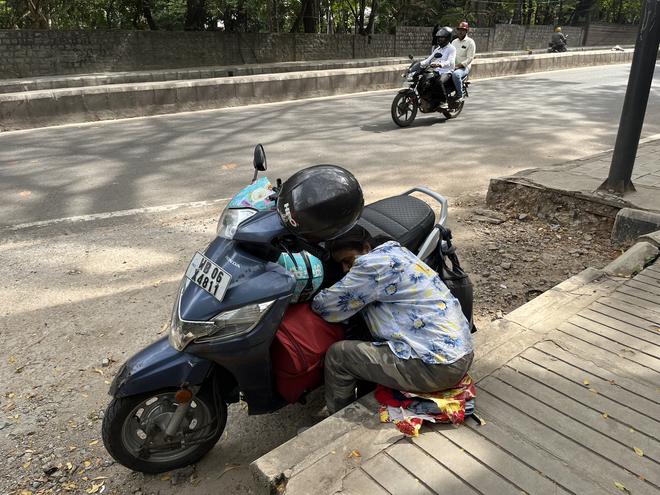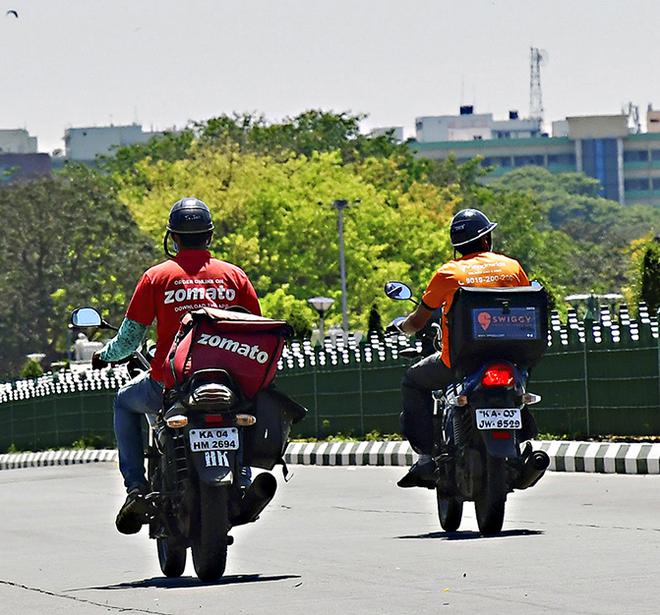It was around 4-4.30 a.m. on August 18 and Gourav Singh (name changed on request), 24, was near BTM Layout Lake in Bengaluru to deliver an order which he had received via a food delivery app. Out of nowhere two boys about his age appeared. They brought out knives and tried to snatch his mobile phone. When he resisted, they tried to stab him. Luckily, he was wearing a sweater, and the knife only tore his sweater and caused a minor injury to his hand. They ran away when he raised an alarm.
Singh had migrated from Rajasthan to earn a living in Bengaluru, the IT capital of the country and started his job as a delivery executive only on August 1. The same day, Gulam Mo Naviraza, another delivery executive, was robbed of his mobile phone and ₹3,500 cash by two men on scooter in the K.G. Halli police station limits in the city.
Get the top news developments from Karnataka right in your inbox. Subscribe to our Karnataka Today newsletter here
Like Singh, many people in their 20s, from different parts of the country as well as Karnataka’s far flung districts come to Bengaluru to take up gig work, as employment opportunities are few and far between in the formal sector. However, of late, gig workers are becoming victims of mugging and assault.
Krishna Raju (name changed), 45, has been a delivery executive for six years. He has noticed that in the post-COVID period, gig work has become less safe owing to robberies and attacks.
“In the last six months, I have had at least two bad experiences. Once around 11 p.m., I was near Begur for my last delivery of the day. One of the roads was dug up and I decided to push my vehicle over that stretch. That is when three people attacked me and demanded money. While I did give them the money, I resisted when they asked for my phone as my livelihood is dependent on it. Then they threatened to bury me in the ditch on the road. I gave them my phone,” he said.
His second experience was near Jigani Road where around 10.30 p.m. two drunk men harassed him and snatched the food he was carrying. He had to wait with the security guard of a building nearby for over half an hour, waiting for his attackers to leave. He said when he narrated the incident to the food delivery company for which he works, while they asked him to return from the spot for his safety, the company also levied a penalty of ₹350 on him.
According to sources in the Police Department, on average, every week, at least two cases of robberies involving delivery executives are reported in the city while many others go unreported.

The police approach
Why are food delivery executives reluctant to file complaints? They say they do not have the time or money to run around police stations or help in investigations. The alleged apathy they face from the police is another reason.
For instance, Singh spoke about how it took him four hours to finish filing a complaint at the Mico Layout Police Station after the incident.
“Had I known that it was going to take so much time, I would not have gone to the police station at all. When we cancel two orders, we miss our incentive on the delivery platform. As it was the weekend, I lost quite a bit of my incentive. I have come here from another state to earn my living. I cannot afford to miss incentives like this,” he said.
Raju said he never lodged complaints as he felt that neither the company nor the police would take his side. “Police officers often question us about why we work in the late hours of the night. When we say that it is for our living, they ask us to buy another phone and go about our job if it is so important to us. I do not see the point in seeking their help,” he said.
While Singh and Raju continue to work in the city, many others, especially those who come from other states, often go back to their hometowns after such incidents.
In July, the Sudduguntepalya police busted a gang of three members, who were targeting food delivery executives and stealing their phones. They recovered 27 mobile phones from the gang. A police officer said that so far, only four victims had reached out to them to claim their phones and that they are trying to track down many others who returned to their native towns in the northern part of the country.
Modus operandi
A senior police officer involved in the investigation said a close study of the pattern of the robberies revealed that the accused targeted executives who operated at night at isolated places, on slow electric scooters.
They mount the mobile phone on the clip fixed to the handle, which helps them with navigation. This has become an easy target for the gangs to attack and rob so that there is no scope for resistance.
According to the police, companies should take precautionary measures like providing a fixed metal frame with display features similar to autorickshaw meters where mobile phones can be placed safely and locked. “We have asked the companies to think about it as a safety measure,” the officer said.
On August 2, Mamum Ahmed was on his moped with his delivery items near Madiwala, while two people wearing full helmets on another bike blocked his way. Wielding a machete, one of the two men got down from the vehicle, assaulted Ahmed, and snatched his phone from his pocket. Ahmed sustained multiple fractures from the assault. The incident took place in the middle of the day and was captured on CCTV cameras installed nearby.
The police officer pointed out that due to the increase in demand, gig jobs in Bengaluru are on the rise and attracting unemployed youth to this unorganised sector. This has led to unhealthy competition and exploitation of staff in terms of job security, unreasonable contracts, exorbitant targets, and a workload of more than 12 hours without holidays. “This is because there are no checks by the competent authority,” the officer noted.
“The police can intervene only when there is a complaint, but they have a limited role to play in resolving larger issues. Those can be resolved only with the intervention of the Labour Department and regular monitoring,” another police officer said.
For their part, the police have identified some vulnerable points and have deployed Hoysala patrolling vehicles so that they can reach the spot quickly in case of a problem. The vulnerable points are identified going by incident reports that are mostly in the southeast, east, and north divisions, the officer said.
Recently. C.K. Baba, Deputy Commissioner of Police, Southeast Division, proposed a standard operating procedure for the safety of the delivery workers. The SOP included measures like identification and establishment of safe delivery zones, a buddy system during deliveries, and provision of safety training and safety gear for delivery executives. He had told The Hindu that it would be made mandatory for companies to adopt these measures.

Other safety concerns
Most delivery executives work 12-15 hours a day on average. They reveal that they make about ₹800 to ₹1,000 a day, out of which they end up spending ₹350 to ₹400 on fuel. They also spend another ₹100 on food and return home with about ₹300 to ₹500. This laborious work culture presents more than one safety concern to the workers.
Mohan Mani, a visiting fellow at the Centre for Labour Studies at the National Law School University of India noted that driving through peak traffic hours to gain peak hour work benefits and the fatigue combined with bad road conditions and old, poorly maintained vehicles put gig workers at the risk for road accidents too.
“Sometimes the workers are faced with bad customers who refuse to pay for the delivery or even threaten and rob workers when the delivery ride is to remote addresses,” Mani noted.
The few women working in the sector face other issues like harassment and unwanted advances by male customers.
“Recently, I was about to deliver an order in Katthriguppe when the customer started calling me repeatedly and started giving different locations. As women, we can instinctively identify malicious intentions and I preemptively called up our support centre and reported that it might be a fake order. They said I should go to the address provided on the app and if the customer asked me to go to a second location, then I must immediately return and ask for additional support. When I reached the address, the customer was there and started asking me for my phone number. It was 11.30 in the night and I lost my cool, scolded him, and got out,” said Gowthami, a delivery executive.
However, she added that when it came to the safety of women delivery workers, the company was very supportive and the workers themselves took certain precautions like not going to vulnerable places in the night.
Along with these, Mani also highlights various physical and mental health problems like stress-related issues, back and shoulder injuries, heart ailments, and gastric ailments that result from the nature of gig work. He also emphasised the role companies can play in covering healthcare insurance of workers (both inpatient and outpatient costs), accident insurance, better payments, and provisions like rest centres for workers.
What companies say
Meanwhile, companies say they are committed to the safety of delivery partners.
“Over the years, Swiggy has been investing in products and policies that prioritise the safety and well-being of delivery partners. Since 2015, Swiggy has been providing cost-free accident insurance with no opt-in required. Additionally, our Emergency Support Services which were launched in 2021 encompass diverse options like a 24x7 hotline number, emergency cards and a direct link to the local police to address delivery partners’ needs during unexpected situations on the road. In an industry-first initiative earlier this year, Swiggy launched a free, fast and on-demand ambulance service for our delivery partners and their dependents,” said a Swiggy spokesperson on email.
Similarly, a spokesperson from Zomato recently said while the company can track their delivery partners in real-time, they had also provided them with safety training. While the SOS feature on the delivery app had an allocation of a buddy (fellow delivery partner) when required, areas that were reported to be unsafe based on various factors were black-zoned, especially for night deliveries. The spokesperson also said on-call ambulances which could reach a delivery partner in 20 minutes anywhere in the city, were available. E-commerce companies like Amazon and Flipkart did not comment on the issue when The Hindu reached out to them.
In the Budget presented recently, Chief Minister Siddaramaiah announced that the State government would offer ₹2 lakh life insurance cover and ₹2 lakh accident insurance cover to gig workers. Be it the government schemes or the benefits offered by the companies, there is also a lack of awareness among many delivery executives, especially those who come from other States.
What gig workers can do
Experts say oligopoly in the market has to be broken in order to bring about a healthier, safer work culture for gig workers.
Mani says, “Workers can organise and join unions to take up common issues as a group for bilateral and tripartite negotiations, and for legal challenges to the platforms. They can reach out to the public to publicise their grievances or opt for action. Workers through their organisations or unions can even reach out to NGOs, progressive technical workers groups, or the Government, to support initiatives to replace the oligopolistic control over the market with experiments like the ‘Namma Yatri’ app in Bengaluru, an auto transport app run by a workers’ union.”







